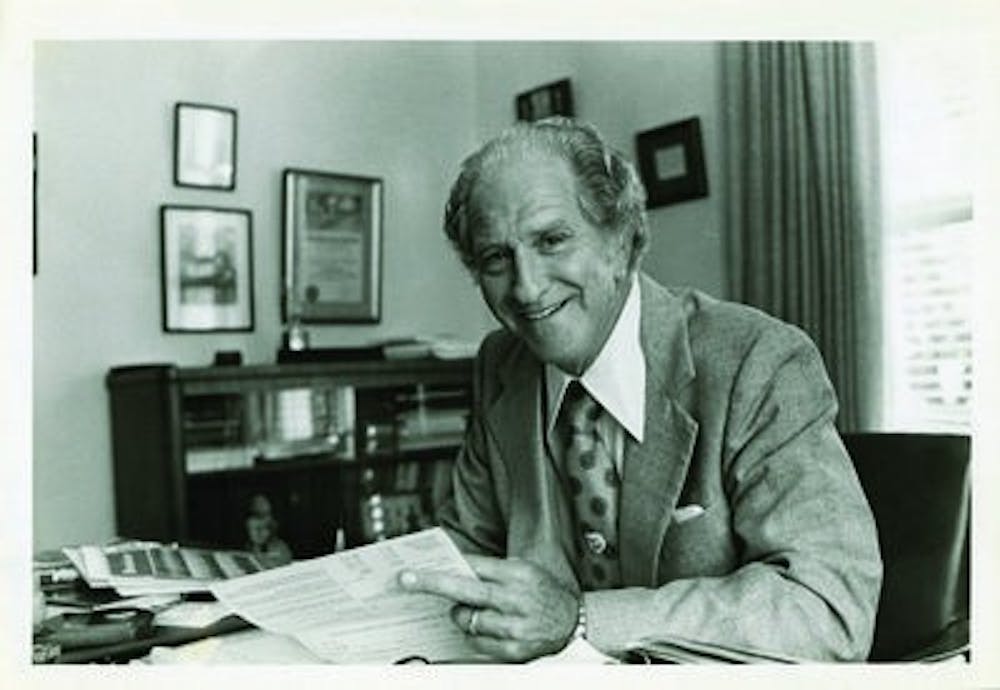To James E. Foy, Auburn meant family. No matter Auburn students' backgrounds or appearances, they always received their dean of student's full attention and respect.
The Auburn Creed calls all Auburn men and women to live to a high standard, and also to believe in Auburn and love it.
Foy, who passed away Friday at the age of 93, believed in Auburn men and women, and he loved them without reservation.
In the 1960s, when tensions were high, the hippie movement was in full swing and the Vietnam War was being protested, Foy reminded Auburn students and faculty how much it means to be a member of the Auburn family.
To Foy, an Auburn bond was an unconditional bond.
In a staff meeting in the late '60s, Lowell Ledbetter, former director of Foy Student Union, said a faculty member said to Foy, "Jim, I notice that you give these hippies that come in here just as much time and attention as you do the clean-cut, sharp-looking students."
In response, Foy said, "A hippie student--the long haired student with grungy clothes--is just as much entitled to my time as the clean-cut student. I might not hire him, but he's an Auburn student, and I respect him."
Foy believed an Auburn man or an Auburn woman, no matter who they were, where they came from or what they believed, deserved his attention.
After all, they were family. This is how Foy lived.
Foy, dean of student affairs from 1950 to 1978, is remembered for his joyous spirit, loyalty to Auburn and for the personal touch he applied to his work and interactions with others.
"I don't know of another person in Auburn history who had as great a hands-on impact on Auburn students as Dean Foy did," said David Housel, former Auburn athletic director. "He was the human touch. All those years, he never met a stranger."
Foy was known for his passion and dedication to the Auburn Creed.
In the 1978 edition of the Glomerata, Foy said, "Dr. Petrie really had it! The creed is where Auburn is at!"
Foy's grandson, Benjamin Spratling IV, said that although Foy was a well recognized figure in Auburn history, he always remained humble, sincere and kind. Spratling said Foy's dedication to his Christian faith and the Auburn Creed were what made that possible.
"He never asked to be famous," Spratling said. "He didn't care. They told him they put his name on a building, and he was like, 'Well, thank you--it's their building; they can do what they want with it.' He was humble, and it wasn't a fake humble. It was real in the fact that he was never self-focused; he was always loving someone else."
Johnny Green, former dean of students from 2006 to 2009, said Foy was always helpful to him and gave good advice.
"He was very compassionate--very down-to-earth," Green said. "For all that we've heard about literally a living legend, he was extremely approachable and would talk to anyone. He did not put on airs or pretend."
Foy's greatest passion was Auburn students, Ledbetter said.
Foy and his wife Emmalu often invited small groups of students to their home, and Ledbetter said he truly enjoyed talking with students.
"I have seen him sit up there on the curb in front of Cater Hall till three and four in the morning talking with students just because he wanted to talk with them about this or that or the other," Ledbetter said.
Spratling said Foy cherished time with his family and adored his wife. Whether it was his family, his coworkers, the Auburn community or his students, Spratling said Foy's mind was always on serving others.
"I think the one thing that I would like people to understand about my granddad is that it was never about him," Spratling said. "None of it was about him. To him, what was important was always his neighbor and his God."
However, Foy also enjoyed Auburn football and passionately cheered on the Tigers.
Foy's "War Eagle" was unique, Housel said.
"The striking thing about Dean Foy is how rabid he was giving a 'War Eagle' when he was young, and how moving and inspiring it was when he was old--still doing it as hard as he could," Housel said. "Dean Foy's 'War Eagles' came not just from the body, but from the soul."
Housel said Foy's legacy can't be restricted to a brick-and-mortar building or a list of accomplishments.
"Dean Foy's greatest accomplishment is in the hearts and minds--perhaps souls--of the young men and women whom he touched," Housel said. "Now that sounds kind of 'pie-in-the-sky,' but in his case, it was real. He cared, and he wasn't afraid to show it."
Although today's generation of Auburn students may have never met Foy, heard him give a War Eagle, or even known who he was, Housel said they are benefiting from what he did at Auburn.
In some ways, Ledbetter said, Foy inspired the concept of the Auburn Family.
"The students today are benefiting from the work and effort and love and commitment of a man they never knew," Housel said. "Auburn was a great place before they came. This man played a major part in making it great."
Do you like this story? The Plainsman doesn't accept money from tuition or student fees, and we don't charge a subscription fee. But you can donate to support The Plainsman.





